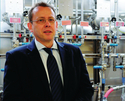A world of knowledge
27 October 2009Joanne Hunter talks to Dr Thomas Goedecke, president of IAPRI, who hopes to grow and strengthen links between scientists on every continent
Dr Thomas Goedecke, newly elected president of the International Association of Packaging Research Institutes, was on a fleeting visit to London from Berlin to see IAPRI’s secretary general Marie Rushton, former director at PIRA International, one of the association’s members. I snatched some of his timeto hear his plans for the next four years to step up communication links between researchers around the world and raise IAPRI’s profile to attract new members.
“As far as I knowis no other global platform in the area of packaging: we are unique,” he tells me. The organisation is ready to shift up a gear, he thinks, and to bring people together: shining the spotlight on IAPRI is an aim he is keen to pursue.
Three years ago, IAPRI opened its doors to research-focused corporations and its total membership has risen above 70. On board are Nestlé Research Centre (CH), Friesland Foods (NL), SCA Heavy Duty Knowledge Center (NL), Kraft Foods Global Packaging (USA) and The Clorox Company (USA), among others, with additions expected in the coming months.
“We are keen to get commercial organisations to join. A commercial researcher sees a whole new way of approaching a problem and their perspective provides a ‘reality check’ for others,” says Dr Goedecke, who considers that it could lead to research with greater potential for commercial application.
IAPRI is where valuable international and inter-personal working relationships are forged. Annual symposia and conferences enable members to meet their opposite numbers from the other side of the world. Dr Goedecke is convinced this promotes better research by avoiding duplication of effort. And researchers together can identify gaps in academic understanding, compare testing procedures and find funding.
From its founding in 1971 by the packaging research institutes of Sweden, Germany, France and the UK, IAPRI was a ‘knowledge transfer network’ before the term became common currency.
A prime aim is to encourage young researchers. Students of member bodies present their work at symposia and get expert feedback. They take part in exchanges with counterparts at labs on other continents.
IAPRI’s agenda grows out of its working groups. A nucleus looking at sustainability is particularly active. Distribution has become a seedbed of research topics, as has anti-counterfeiting and product security. The Flexibles group has made strong Europe-USA links, while a research networking group is finding ‘hot’ new areas for study in terms of the geographic focus and subject matter.
Dr Goedecke specialises in dangerous goods packaging and logistics at the Federal Institute for Materials Research and Testing (BAM) in Berlin, lectures at the University of Dortmund, and is an editorial board member of Packaging Technology and Science journal.
Convenor of the IAPRI’s Dangerous Goods Working Group since 2002, he says: “Working groups allow members to interact in the months between annual events. These alternate between symposia, which are for members only, and conferences, which we open to non-members.”
Symposia attract up to 200 and conferences as many as 500 delegates.
“We are an enabler; a communication channel. The more members we have, the more visible IAPRA will be, the better for packaging research. To encourage growth and active membership, fees are kept as low as possible: £400 (€480) per year for academic and research based institutions; while corporate members pay £900 (€1,080) per year.
Next year’s IAPRA conference will be in China and in 2011 a symposium in Berlin, from 15-18 May, will mean international visitors can spend time at Interpack, in Düsseldorf.
Indirectly, IAPRI can help get things done. Being a UN delegation member in the area of dangerous goods, Dr Goedecke says he is ‘in a position to consult and help guide regulation’, for example.
To further make his point, IAPRI members involved with testing vibration, shocks and environmental impacts during transport distribution on sensitive goods, are exchanging data between the USA, Asia and Europe. “You get instant answers,” he says, and this speeds up investigation results.
Ahead of the 2010 event in China, IAPRI has gained five new Chinese members. It further demonstrates that membership breaks down barriers to global research.
Says Dr Goedecke: “With language issues, you wouldn’t know where to start to find the person to tell you what you need to know in another part of the world.”
Dr Thomas Goedecke, president of IAPRI Dr Thomas Goedecke


